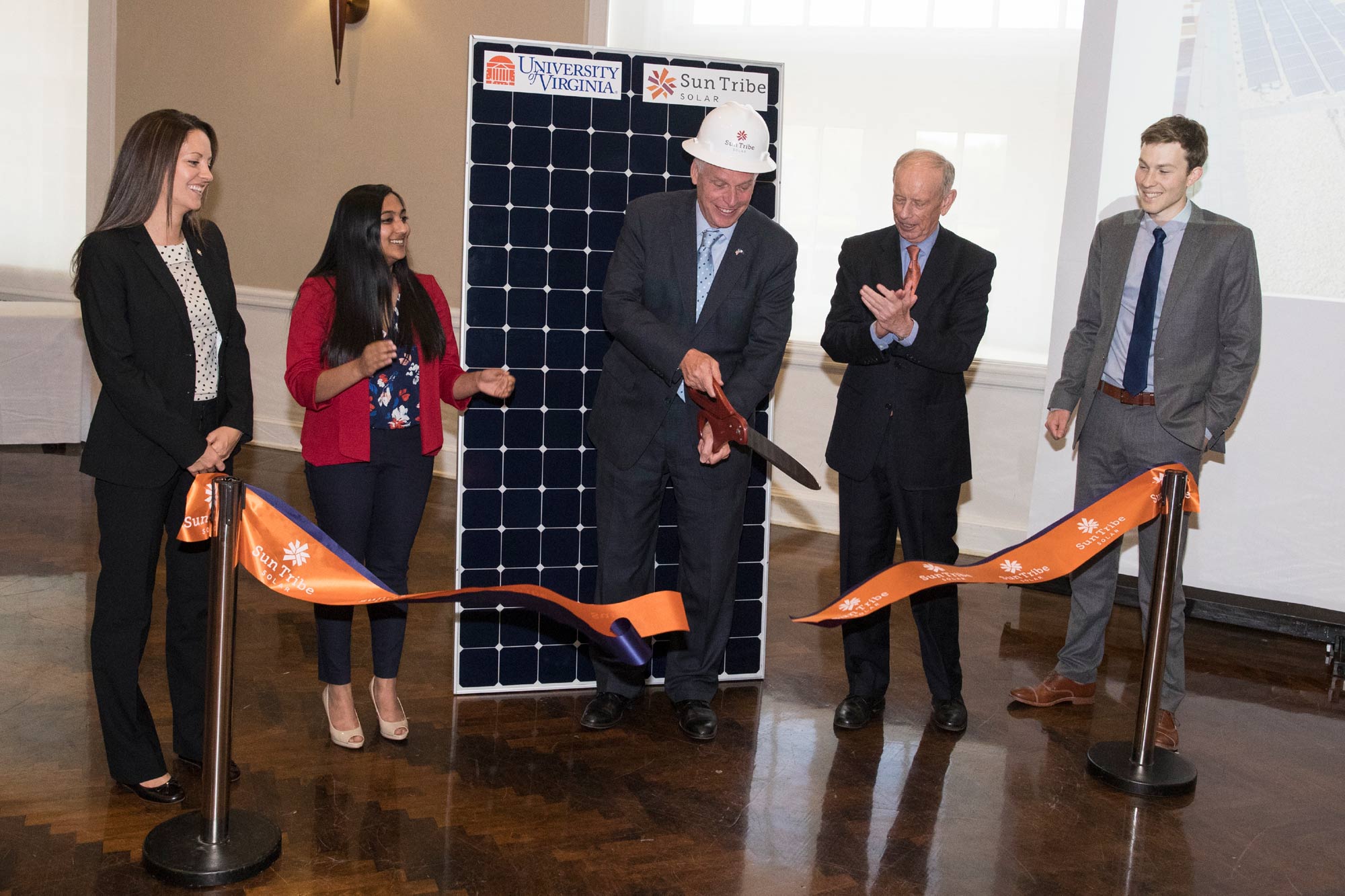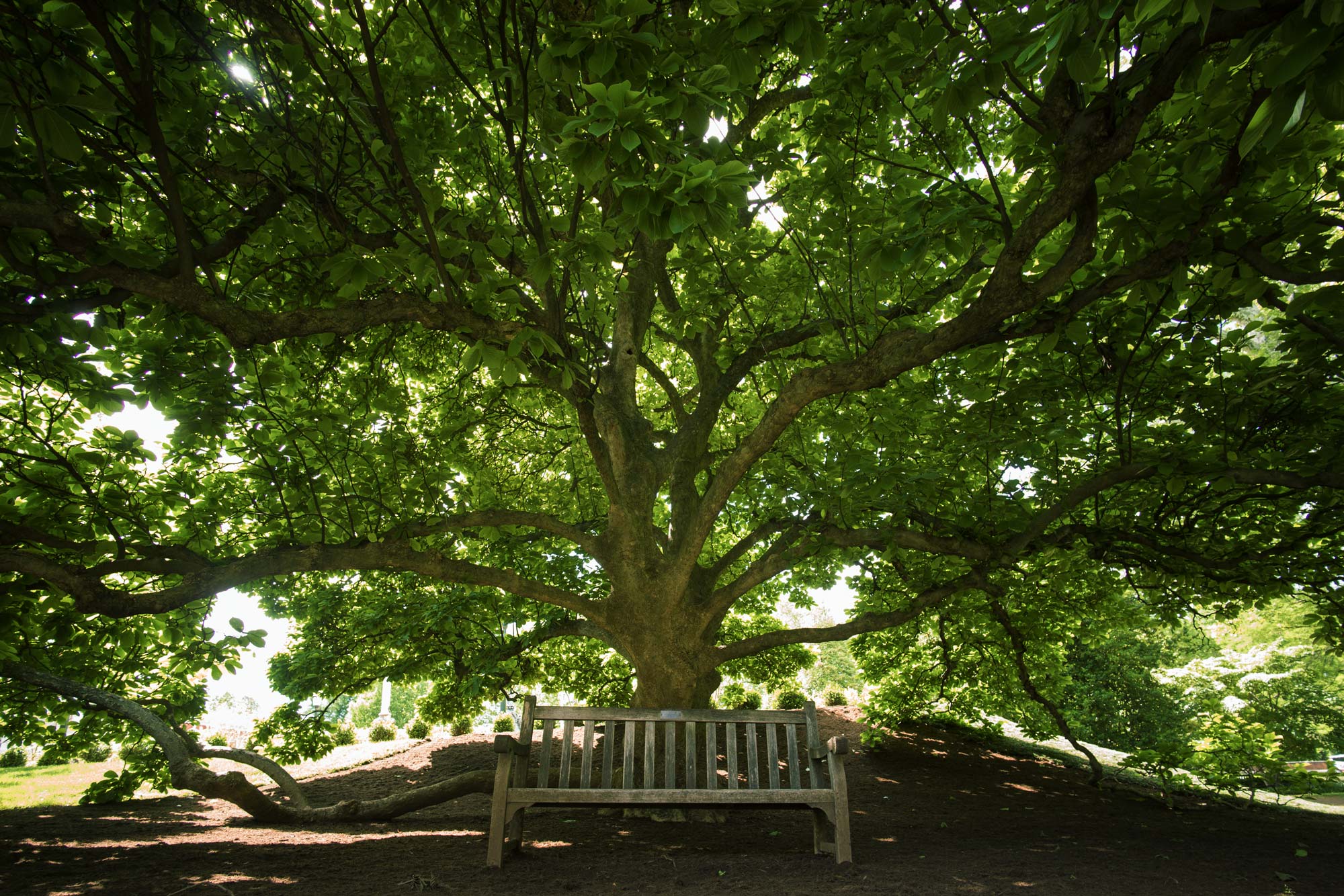The University of Virginia Board of Visitors Buildings and Grounds Committee on Friday received an update on the University’s accomplishments as a global leader in sustainability, including advances in curriculum, student experience, research, practices on Grounds and local engagement.
The update summarizes recent steps the University has taken to be environmentally responsible, in engaging with the local community, stewarding resources and developing solutions.
“The University of Virginia has been, and continues to be, a leader in sustainable practices,” Kevin Fay, who chairs the Buildings and Grounds Committee, said. “Sustainability is ingrained in the University’s culture, and the depth of activity here shows again that UVA has a resolute commitment to be responsible environmental stewards.”
Under the engagement area, outlined by Senior Vice President for Operations Colette Sheehy, the report notes that Virginia Gov. Terry McAuliffe helped celebrate, during an Earth Week Expo, UVA’s leadership in renewable energy with a ribbon-cutting for solar panels on the roof of Clemons Library, an array that will supply 15 percent of the library’s electric draw. On Feb. 27, UVA also hosted the first “zero waste” men’s basketball game ever held in the Atlantic Coast Conference, diverting from the landfill 93.4 percent of waste from the Cavaliers’ sold-out contest against the University of North Carolina.

Virginia Gov. Terry McAuliffe cuts a ceremonial ribbon launching a solar array on Clemons Library that will provide 15 percent of the building’s electricity. (Photos by Dan Addison, University Communications)
The University also backed eight student projects with $27,000 of Equity and Environment Funds, including the Black Presidents Council’s Food Justice Month, the Greens to Grounds student organization’s produce boxes for Access UVA students, and City Schoolyard Garden student projects.
Under the discovery area update, Sheehy noted that the University invested $24,000 in development grants for courses including “The Ethics of Food,” “Water Sustainability,” “Sustainability Science” and “Population, Resources and Environmental Sustainability,” as well as $16,000 in research grants for projects including “Evaluating Bee Hotels as Conservation Tools” and “Fostering University Collaboration for Sustainable Food Procurement.” In addition, the Jefferson Trust invested $20,771 in the student solar car team at the School of Engineering and Applied Science, and the McIntire School of Commerce developed a 13-week, online program in sustainable business.
On stewardship issues, the University’s Greenhouse Gas Action Plan, enacted in 2017, already has reduced emissions by 11 percent below 2009 levels and reduced building energy use intensity by 10 percent below 2010 levels. UVA Dining was accepted to the Virginia Department of Environmental Quality’s Environmental Excellence Program at the “exemplary environmental enterprise” level, becoming the first university in Virginia to achieve Green Restaurant certification.

Colette Sheehy, UVA’s senior vice president for operations, summarized the University’s sustainability accomplishments before the Buildings and Grounds Committee.
The board’s committee also issued a statement, entitled “UVA’s Commitment to Sustainability and Responsible Stewardship,” that, among other things, clarifies the University position on investments that relate to fossil fuels.
Because of its strong financial position, UVA has been able to support an array of sustainability measures, including teaching, research and operational initiatives. To continue to fund these initiatives, the board has determined it will maintain its current investment practices with the University of Virginia Investment Management Company, which maintains a diversified investment portfolio designed to provide long-term financial benefits to UVA’s students, faculty and staff within the risk tolerance of the University. Distributions from these investments provide a vital source of funding for many University operating programs.
“Sustainability at UVA is closely connected to the University’s Cornerstone Plan, particularly with its emphasis on collaborative decision-making, student leadership, high-impact student experiences and organizational excellence,” the committee’s statement said.
In 2016, the University adopted a five-year sustainability plan, devised by approximately 120 students, faculty and staff members. The plan seeks to incorporate sustainability into the University’s operations and curriculum. Goals include:
- a 25 percent reduction in the University’s carbon footprint by 2025;
- reducing building energy use 20 percent below 2010 levels by 2020;
- reducing UVA’s nitrogen footprint by 25 percent;
- lowering potable water use by 25 percent below 2010 levels by 2035;
- increasing the number of sustainable buildings on Grounds;
- reducing the total weight of waste generated at UVA by 50 percent below 2014 amounts; and
- increasing the amount of sustainable food and beverages available on Grounds.
As part of its carbon footprint reduction, the University is increasing the amount of solar energy used on Grounds. In December, UVA announced a collaboration with Dominion Energy that will produce about 17 megawatts of solar electricity for the electric grid, meeting about 12 percent of UVA’s total electric demand. The University is planning more joint projects with Dominion, which is also renting roof space on two UVA buildings for solar panels feeding into Dominion’s electric grid.

Since 2011, UVA has reduced water use by more than 30 percent from an all-time high in 1999. To date, the University has 44 Leadership in Energy and Environmental Design-certified buildings, representing more than 2.2 million square feet.
UVA has received several accolades for sustainability, including from the Association for the Advancement of Sustainability in Higher Education, which ranked UVA as a top performer in the 2016 Sustainable Campus Index; the Green Ribbon Schools honor in 2015 from the U.S. Department of Education, one of only nine post-secondary institutions in the United States to be so honored, and the only one in Virginia; and praise from the Princeton Review’s Guide to 353 Green Colleges, which cited UVA’s exceptional commitment to sustainability based on course offerings and student preparation for sustainability careers.
Sustainability is also incorporated into curriculum and research, with students, faculty and alumni working on opening new paths to global environmental sustainability based on science, design, cultural understanding and policy.
In addition to active student participation on the Committee on Sustainability, more than 30 sustainability-related, student-led organizations approach sustainability from every angle, from responsibly sourced food in dining halls to initiating bicycle repair stations around Grounds to making art with recycled materials.
Media Contact
Article Information
June 9, 2017
/content/bov-committee-explores-universitys-sustainability-accomplishments

